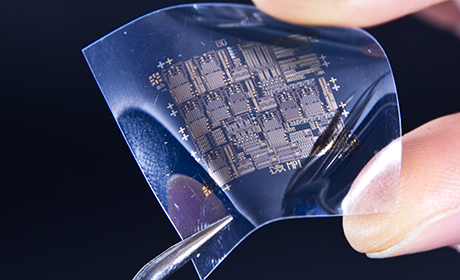New Collaborative Research Centre in the Chemistry of Organic Materials
21 November 2016

Photo: Hagen Klauk, Max Planck Institute for Solid State Research, Stuttgart
Electric circuits on flexible plastic supports require soft organic semiconductors, materials which will be developed and studied in the newly established collaborative research centre CRC 1249.
Following a successful expert evaluation, Heidelberg University is receiving a new collaborative research centre in chemistry. In the latest approval round, the German Research Foundation (DFG) awarded funding for CRC 1249,"N-Heteropolycycles as Functional Materials". The research network's 17 subprojects are focussed on developing new organic semiconductors and investigating the elementary charge transport processes that determine their properties. The DFG is providing a total of nine million euros for a period of four years. Prof. Dr Lutz H. Gade of the Institute of Inorganic Chemistry will serve as spokesperson. Research is slated to begin in January 2017.
According to Prof. Gade, the semiconductors will be developed on the basis of a large and flexibly variable class of compounds, the N-heteropolycyclic aromatic hydrocarbons. The new electronic materials are not based on silicon or other inorganic semiconductors, but are organic hydrocarbon derivatives with ring structures that contain nitrogen atoms. Since these materials are "soft" and can be processed at low temperatures, flexible media such as plastic foil can be used as supports for electronic components. "Even though there is already a flurry of research activities surrounding the development of organic semiconductor materials, targeted access to new substance classes with specific material properties remains a major challenge," stresses Prof. Gade.
CRC 1249 will work on developing methods for chemical synthesis, studying the physical, spectroscopic and theoretical characteristics of the newly developed organic semiconductors, and investigating their material properties in optoelectronic devices. "The goal is to identify the essential structural elements determining the properties of these new substances, by way of close interplay of experiment and theory," states Prof. Gade. In addition to the Heidelberg University research groups from the institutes of chemistry, the Interdisciplinary Center for Scientific Computing, the Center for Advanced Materials and the Kirchhoff Institute for Physics, researchers from the Karlsruhe Institute for Technology and the Max Planck Institute for Solid State Research in Stuttgart will also participate in the new collaborative research centre.

